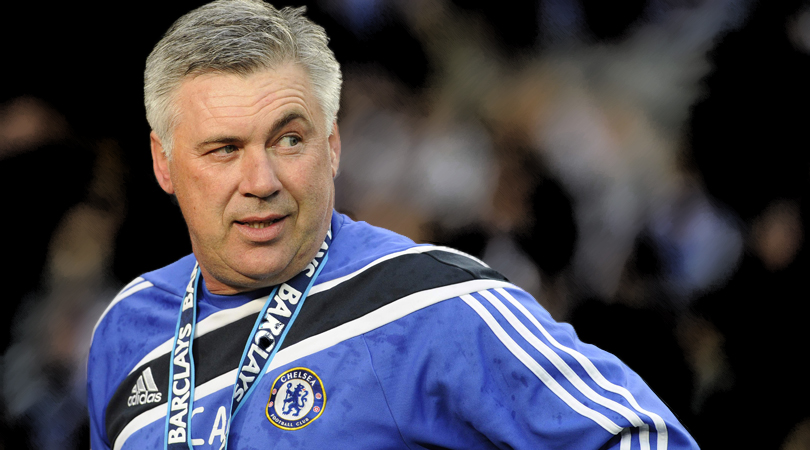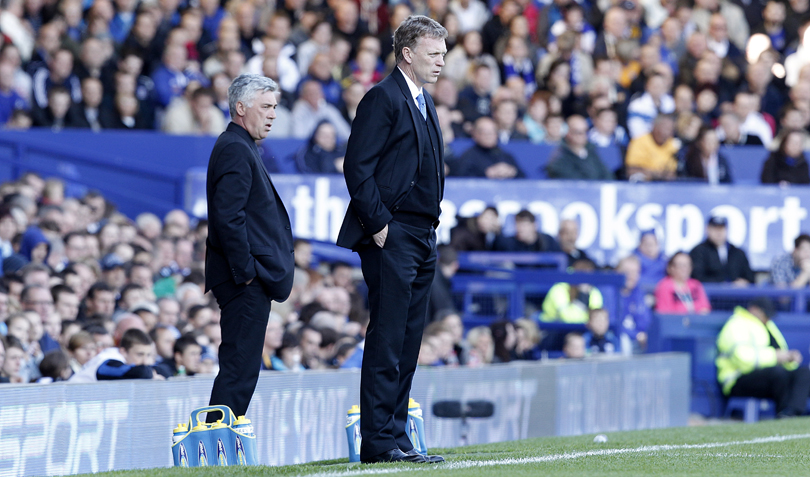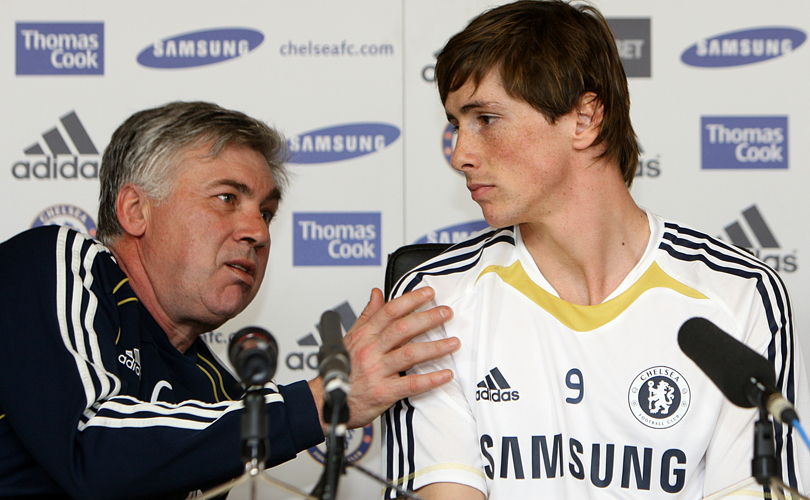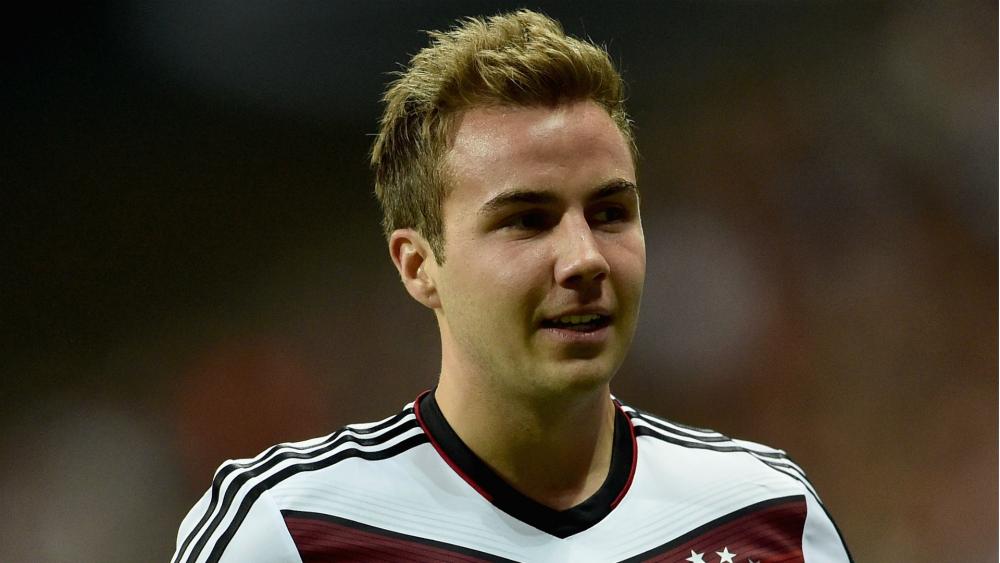Ancelotti at Chelsea: When Carlo came to England the first time around
The likeable Italian tactician is in the frame to replace Brendan Rodgers at Liverpool – and if his time at Stamford Bridge is anything to go by, he’d be a popular arrival for fans and players alike, writes Liam Twomey…

Brendan Rodgers’ time at Liverpool is done, reportedly ended in crushing fashion by a transatlantic phone call from Fenway Sports Group president Mike Gordon as he reflected on Sunday’s 1-1 draw away to Everton.
Carlo Ancelotti will surely sympathise, even if one manager’s devastation is another’s opportunity. Four years ago the Italian didn’t make it out of Goodison Park before being approached by Chelsea’s then-chief executive Ron Gourlay and informed that his services would no longer be required.
The timing and manner of Ancelotti’s dismissal, carried out within an hour of the final game of the season and barely a year after Chelsea’s first-ever Double, was widely viewed as further proof of Roman Abramovich’s heartless brutality and his club’s lack of class. Ancelotti interpreted things rather differently.

“What would have been the point in waiting?’ he later told the Daily Mail. “If they have something to tell me I prefer to know immediately. Ron was very professional about it. The players were on the bus.
"We were in the dressing room alone. He told me and that was that.” Ancelotti then boarded the bus, travelled back to London and held a farewell party that rumbled on into the early hours.
It was a reaction true to the mantra of Nils Liedholm, a former coach and mentor in Ancelotti’s playing days at Roma: “Football is the most important of the less important things in life.”
It is also a mark of the man Liverpool will be getting to succeed Rodgers should they want him to take on one of English football’s most formidable rebuilding jobs.
Get FourFourTwo Newsletter
The best features, fun and footballing quizzes, straight to your inbox every week.
Let him entertain you
Chelsea gained one of their greatest ever and, in time, Ancelotti found the courage to pick systems to suit his star players rather than the other way around
Ancelotti arrived at Chelsea in June 2009 but his first significant contribution to the club’s success came much earlier. In 1996 he was making his managerial name as a staunch disciple of the great Arrigo Sacchi at Parma, but not without cost. “For six months I played [Gianfranco] Zola as a winger, because he had to fit into 4-4-2, and in the end he left to go to Chelsea,” Ancelotti recalled. “And I lost a great player.” Chelsea gained one of their greatest ever and, in time, Ancelotti found the courage to pick systems to suit his star players rather than the other way around.
This tactical versatility laid the foundation for his debut season at Stamford Bridge. With opponents beginning to figure out the 4-4-2 diamond that had laid waste to Premier League foes until Christmas, Ancelotti shifted between 4-3-2-1, 4-3-3 and 4-2-3-1 during the run-in to keep his key men firing.

The results were astonishing. Didier Drogba won the Premier League’s Golden Boot with 29 goals as both he and Frank Lampard enjoyed the most prolific scoring seasons of their careers. Nicolas Anelka’s nomadic spirit was settled and Florent Malouda found the form of his life. Once a relatively charmless Jose Mourinho winning machine, Chelsea were re-cast as English football’s entertainers, scoring a Premier League record 103 goals and netting seven or more on four separate occasions. Rivals were also dominated, with Manchester United, Arsenal and Liverpool all beaten home and away.
Mr Nice Guy
Ancelotti created a happy, relaxed atmosphere that encouraged his players to express themselves. Before the FA Cup final against Portsmouth, he surprised the team by asking them to come up with the strategy.
The press were charmed by Ancelotti’s cuddly uncle persona and the door to his office, permanently scented with cigarettes and espresso
“That season we played 60 games, and 60 times I made the strategy,” he told the Financial Times in January 2014. “So I think the players understood very well what they had to do.” Chelsea hit the woodwork five times in the first half and eventually triumphed 1-0 at Wembley. The press were charmed by Ancelotti’s cuddly uncle persona and the door to his office, permanently scented with cigarettes and espresso, was invariably open to players, staff and journalists alike. Chelsea were becoming likeable again.

Yet even early on there were times when the lack of intensity seemed counter-productive. Six sloppy defeats meant the most devastating attacking team of the Premier League era claimed the title by a single point, and Ancelotti’s free-flowing Chelsea were picked off by Mourinho’s Inter in the Champions League.
The flaw evident in Ancelotti’s ascent to the top of English football in 2010 would prove integral to his downfall a year later. Chelsea’s wavering concentration was punished by a resurgent United in the Premier League and Champions League – the competition Abramovich had become obsessed with conquering.
Bad luck played a role; Lampard, captain John Terry and Michael Essien all missed significant time due to injury and Drogba contracted malaria, stretching a squad left thin by the summer departures of Joe Cole, Michael Ballack, Juliano Belletti, Deco and Ricardo Carvalho to breaking point.
David Luiz’s arrival from Benfica in January was a welcome boost, the blockbuster deadline-day capture of Fernando Torres from Liverpool less so. The Spaniard scored one goal in 18 games as Chelsea’s season petered out and his failings were wrongly attributed to Ancelotti.

By then the Italian had already been cut off at the knees by the loss of assistant and close friend Ray Wilkins, fired after reportedly clashing with Abramovich. “Ray is one of those select few, always present, noble in spirit, a real blue blood, Chelsea flows in his veins,” Ancelotti later wrote in his autobiography. “His heart beats in two languages, and that helped me. Without him, we couldn't have won a thing, and in particular we would not have started the [2009/10] year at supersonic speed.”
Dinner date
I felt he was a manager I could rely on. He would always talk straight to me
Domestic and European defeat to Manchester United sealed Ancelotti’s fate but it is telling that he never lost the respect or affection of Chelsea’s senior players.
“A great man and a great coach,” was Lampard’s assessment. “I felt he was a manager I could rely on. He would always talk straight to me. I couldn’t say anything but the highest words for him.” Lampard was pictured dining out with Ancelotti and New York City FC team-mate Andrea Pirlo last month.
Terry is particularly indebted to Ancelotti, who provided a shield when reports about his personal life meant Fabio Capello stripped him of the England captaincy. “I was very close with Carlo both on and off the pitch,” he said in the summer. “He’s a close second to Jose in terms of my favourite manager. I’d love to see him back in the Premier League and winning things.” Before long he surely will be – at Anfield or elsewhere.
